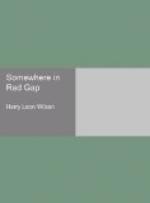“Pretty soon Broadmoor was closed like you seen it to-day. Sister is now back in Boston, keeping tabs on orchestras and attending lectures on the higher birds; and brother at last has his orchid ranch somewhere down in California. He’s got one pet orchid that I heard cost twelve thousand dollars—I don’t know why. But he’s very happy living his own life. The last I heard of mother she was exploring the headwaters of the Amazon River, hunting crocodiles and jaguars and natives, and so on.
“She was a good old sport, though. She showed that by the way she simmered down about Cousin Egbert’s cat before she left. At first, she wanted to lay for it and put a bullet through its cowardly heart. Then she must of seen the laugh was on her, all right; for what did she do? Why, the last thing she done was to box up all these silver cups her beagles had won and send ’em over to Kate, in care of his owner—all the eye-cups and custard bowls, and so on. Cousin Egbert shows ’em off to every one.
“‘Just a few cups that Kate won,’ he’ll say. ’I want to tell you he’s some beetle-cat! Look what he’s come up to—and out of nothing, you might say!’”
VIII
PETE’S B’OTHER-IN-LAW
On the Arrowhead Ranch it was noon by the bell that Lew Wee loves to clang. It may have been half an hour earlier or later on other ranches, for Lew Wee is no petty precisian. Ma Pettengill had ridden off at dawn; and, rather than eat luncheon in solitary state, I joined her retainers for the meal in the big kitchen, which is one of my prized privileges. A dozen of us sat at the long oilcloth-covered table and assuaged the more urgent pangs of hunger in a haste that was speechless and far from hygienic. No man of us chewed the new beef a proper number of times; he swallowed intently and reached for more. It was rather like twenty minutes for dinner at what our railway laureates call an eating house. Lew Wee shuffled in bored nonchalance between range and table. It was an old story to him.
The meal might have gone to a silent end, though moderating in pace; but we had with us to-day—as a toastmaster will put it—the young veterinary from Spokane. This made for talk after actual starvation had been averted—fragmentary gossip of the great city; of neighbouring ranches in the valley, where professional duty had called him; of Adolph, our milk-strain Durham bull, whose indisposition had brought him several times to Arrowhead; and then of Squat, our youngest cowboy, from whose fair brow the intrepid veterinary, on his last previous visit, had removed a sizable and embarrassing wen with what looked to me like a pair of pruning shears.




